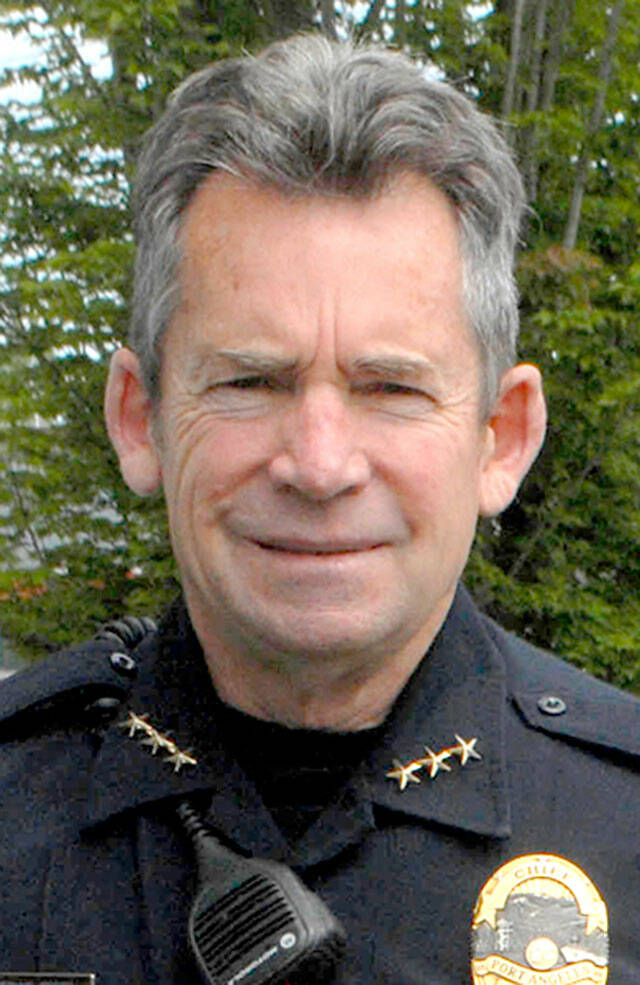PORT ANGELES — Port Angeles police used naloxone nasal spray to save the life of a man who overdosed in the Port Angeles City Pier bathroom.
The 43-year-old was found shortly after 8 a.m. Sunday unconscious, not breathing and with a syringe in his hand, according to a police report written by Officer T.J. Mueller.
“CPR was started and [the man] eventually regained a pulse,” according to the report.
“[The man] was administered [two doses] of Narcan. EMS stated this was the 4th or 5th time [the man] had overdosed in recent time.”
Chief Brian Smith said Wednesday the man was put on advanced life support and taken to Olympic Medical Center under a Washington Involuntary Treatment Act (ITA) referral.
The man was stabilized and transferred, hospital spokesperson Bobby Beeman said Wednesday.
It’s difficult to obtain information about what happened next. He could have sought help or could have been involuntarily committed for drug or mental health treatment. Health Insurance Portability and Accountability Act (HIPAA) privacy regulations limit information from health care providers.
The man was the 35th person since 2015 who has been revived with the use of the opioid-reversal medication by a Port Angeles police officer, Smith said, adding that the medication is widely available commercially, making it hard to determine how many total deaths it has prevented.
Since May 30, Port Angeles police and fire department units have responded to 18 drug overdoses, about one a week over four months, Smith said.
During that time, five additional drug overdoses were reported to 9-1-1 and in Clallam County areas outside the city.
“We believe the wider use of fentanyl is a factor,” Smith said.
The process under an ITA referral is that the person at OMC is evaluated by a doctor, nurse or other medical professional for possible further appraisal by a Peninsula Behavioral Health Designated Crisis Response Team, said Monica Vanderheiden, PBH clinical director of intensive services, on Wednesday.
She said the team would determine if the person would receive involuntary treatment at an inpatient psychiatric hospital or at a substance abuse treatment center outside of Clallam or Jefferson counties.
“Even if a crisis team does an evaluation and it did not meet the criteria for involuntary treatment, the crisis team would connect” the person with a less restrictive alternative, such as inpatient treatment, Vanderheiden said.
“We have lots of options.
“Our goal is to identify less restrictive alternatives and go with that.”
The DCR team can involuntarily detain a person for up to 120 hours, after which additional time can be added by Superior Court.
Peninsula Communications 9-1-1 dispatch was alerted to the man’s condition by a caller who said his cellphone battery was down to 1 percent and who was frantically looking for a plug-in, according to a recording of the call.
“Um, yeah, I think somebody just OD’d in the bathroom,” the caller told the dispatcher.
“He’s lying on the floor.
“He’s unconscious and purple.
“It didn’t look like he was breathing.”
The man was first attended to by Mueller, Officer Mike Johnson and Cpl. Erik Smith.
Port Angeles Fire Department paramedics administered advanced cardiac life support, resuscitating him before transporting him to OMC, Smith said in an email.
Once naloxone and CPR are administered, a patient often recovers and is not referred for hospital care, leaving them on their own — and still with a drug problem, Smith said.
“Twenty-five percent of them can get up and walk away,” he said.
“They are still a person in need of services and follow-up.
“We have a lot of carrots but not a lot of sticks,” Smith added.
“Overall, we lack the power to compel people who need … services and in many situations to get the help they need.”
Smith and Vanderheiden said their effectiveness in handling drug- and mental-health crises has been hampered by the state Legislature’s passage of House Bill 1310, which limits police use of force and, Smith said, hands-on interaction in crisis situations.
The Volunteers of America 24-7 regional crisis line for drug-related and mental crises is 1-888-910-0416, and its website is imhurting.org.
A person can be reached at PBH between 8 a.m. and 5 p.m. Monday through Friday at 360-457-0431.
Crisis response teams are dispatched through Volunteers of America.
“It’s important for our community to know that, if they have concerns, there’s never a wrong time to call,” Vanderheiden said.
________
Senior Staff Writer Paul Gottlieb can be reached at 360-452-2345, ext. 55650, or at pgottlieb@peninsuladailynews.com.

